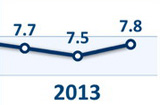Cleaning Up Cyberspace
Updated: 2013-09-02 15:39Regulating rumors
Sina Weibo established a team in 2010 to label misinformation after confirmation. Last year, it went further by opening a platform for Internet users to report false rumors online. The number of participants has reached around 20,000. It has received approximately 11,380 reports of deceptive information and dealt with 11,358 of them, the company said.
In the wake of the Erma case, Sina Weibo has pledged to improve its system for monitoring rumors.
Fabricated details, exaggerated facts, publishing old information and interpreting information out of context are common, said Mao Taotao, a Sina Weibo employee in charge of monitoring rumors.
"We also deal with cases in which someone published and spread completely false rumors online or published photos that were not in accordance with their text," he said. "In addition, some incomplete information was identified as fake."
Internet regulators have also taken actions against online false rumors. On August 1, the Beijing Internet Information Office, along with the Beijing Internet Association, coordinated six Internet service providers to launch an anti-misinformation platform.
The platform was jointly launched by Sina Weibo, search portals including Baidu.com and Sogou.com, as well as Web portals including Qianlong.com, Sohu.com and 163.com. It collects statements from member websites in order to refute online false rumors and expose the websites running phishing scams where users are tricked into giving up the username and password for their e-mail or social media accounts so that a third party can gain control over these.
"The platform is a new attempt by these Beijing-based websites, aiming to help Internet users to separate false rumors from the truth," said Chen Hua, Director of the Internet Information Service and Management Department under the Being Internet Information Office.
Meanwhile, many legal experts have called for stricter criminal sanctions in order to curb online false rumors.
"Citizens' right to express themselves should be protected, but if their speeches violate others' legitimate rights and interests, they should be held accountable," said Liu Deliang, a professor with the Law School of Beijing Normal University.
Liu believes that the openness of the Internet provides an environment that allows for rumors to spread quickly. "Someone who creates false rumors may think they might evade punishment, and other netizens may repost rumors without verifying its truth first," Liu said.
China now has a number of laws and regulations that specify punishments for rumormongers, including the Criminal Law, the Law on Public Security Administration Punishments and the Regulations on Information Services on the Internet.
According to the Law on Public Security Administration Punishments, enacted in 2006, spreading misinformation and false reports is punishable by five to 10 days in jail for disturbing public order. Culprits also face fines of up to 500 yuan ($82).
"Users of the Internet should assume the same legal responsibilities as they would in the real world," said Cheng Bin, a lawyer with Beijing-based Guandao Law Firm, adding that citizens should fulfill their obligations of maintaining online order while enjoying their right to free speech.
"Freedom and responsibility are inseparable in the field of information transmission," said Liao Shengqing, Dean of the Communications Department at the Journalism School at Shanghai-based Fudan University. "Citizens should shoulder social liabilities when reposting and sharing information."























